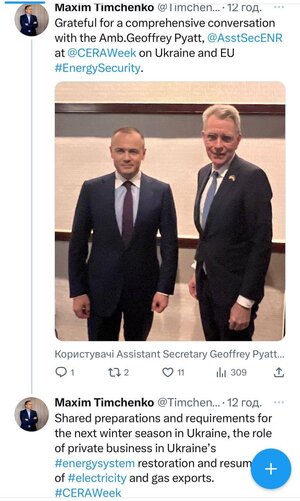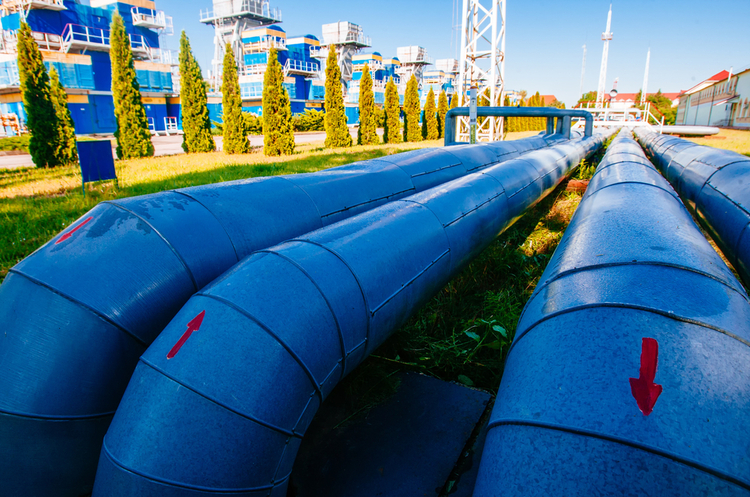Private gas producers want to resume exports of Ukrainian gas
This may slow down energy resources accumulation for the needs of the war economy
Today, russia launched another missile attack on Ukraine's energy infrastructure. Important equipment has been damaged, so the issue of emergency power cuts for consumers is once again on the agenda.
Such incidents complicate the course of the war for Ukraine and are a means of forcing the country's political leadership to negotiate. The power system deficit also delays the resumption of at least partial exports of Ukrainian electricity to Europe, forces our businesses to spend money on expensive electricity imports and hampers preparations for the next winter season. And according to forecasts, it may be more stressful than the last one for the entire European region, not just Ukraine. The reasons for the negative expectations may be related to market volatility and another spike in energy prices provoked by russian aggression, if not to a severe fuel shortage. The situation on the domestic market may also create additional risks for Ukraine.
A potential conflict of interest between the state and Ukrainian private gas producers has unexpectedly emerged during the CERAWeek international conference, which is taking place these days in Houston, USA.
Mind analysed the contradictions between the statements of private players and official decisions of the authorities and how this could affect the domestic energy market and preparations for the next winter.
What is going on with Ukrainian gas production? Due to a full-scale war and a lack of investment, Ukraine is expected to reduce gas production by 6% in 2022 compared to 2021, to 18.5 bcm, according to preliminary estimates.
"Ukrgazvydobuvannia remained the country's largest gas producer: last year, it produced 13.2 bcm of gas, down 3% from the year before. "Ukrnafta reduced gas production by 7% to 1 bcm in 2022. Private companies showed the biggest drop in production – to 4.3 bcm, which is 15% less than in 2021.
Who is ready to discuss this now? The topic of the war in Ukraine and its implications for global energy security was most powerfully presented at the CERAWeek agendas at a special panel held on Monday, 6 March, with the support of the Polish energy corporation Orlen Group. The foreign participants of the debate were American diplomats Carlos Pascual and Jeffrey Payet (currently an official at the Bureau of Energy Resources at the US Department of State), DG Energy of the European Commission Ditte Juul Jorgensen and Deputy Chairman of the Munich Security Conference Boris Ruge. Ukraine was represented by Maksym Tymchenko, CEO of oligarch Rinat Akhmetov's DTEK. The issues they discussed covered transatlantic unity, the restoration of Ukraine's territorial integrity, and resources for reconstruction and development.
How did the private players' "separate path" reveal itself? The topic of possible gas exports was raised for the first time this year in a public discussion during the conference by Maxim Tymchenko.

Thanking Geoffrey Pyatt for an "exhaustive conversation" on "energy security of Ukraine and the EU", DTEK's CEO noted "the role of private business in rebuilding the Ukrainian energy system and resuming electricity and gas exports."
The most notable thing about this tweet was DTEK's emphasis on its own interest in supplying Ukrainian gas to the EU, where prices are higher than on our domestic market. This comes amid a ban on gas exports from Ukraine this year.
Geoffrey Pyatt confined himself to reporting "important discussions on support for both the immediate needs of Ukraine's energy sector and its long-term reconstruction priorities" with Maxim Tymchenko.
What is the "conflict of interest"? Rinat Akhmetov's company is the largest private gas producer in Ukraine. Together with the resources of other private producers, as well as Ukrgazvydobuvannia and Ukrnafta, which are part of the state holding Naftogaz of Ukraine, Ukrainian gas is extremely important for supporting the national economy and energy security in the hard conditions of war.
Therefore, in March 2022, a week after the start of the full-scale invasion of russia, the first orders issued by the Ministry of Energy included one that banned gas exports from the customs territory of Ukraine "due to the hostilities". And in June 2022, the government issued a decree to zero out quotas for the export of thermal coal and gas of Ukrainian origin "due to the armed aggression of the russian federation against Ukraine and the introduction of martial law in Ukraine."
On 27 December, the Cabinet of Ministers approved a new list of goods subject to licensing and quotas for 2023. This document extended the temporary ban on Ukrainian gas exports.
Private gas producers do not publicly criticise the government's decision, but in informal conversations admit that they do not like the state's interference in business processes during martial law. They are sensitive to the ban on exports of Ukrainian gas to the EU, where there is an opportunity to make money from the fuel shortage. Business needs funds to maintain Ukrainian gas production, which in turn will make Ukraine independent of imports. Among the arguments, private business also mentions a decline in taxes paid to the budget as a result of the gas export ban.
The state has a different vision of how Ukraine can effectively overcome the consequences of russian aggression, strengthen energy security and prepare for the next winter.
In an interview with Bloomberg, Naftogaz CEO Oleksiy Chernyshov said that Ukraine intends to avoid gas imports altogether this year by increasing domestic production to meet the needs of all consumers. According to the plan, the state holding company is to increase production by 8%, and private companies by 16% "in the face of a ban on natural gas exports."
What do traders say on this issue? In the dispute over the ban on Ukrainian gas exports, the government is siding with private Ukrainian gas traders who cooperate with farmers and small and medium-sized businesses. They have been an essential anti-crisis pillar of the national economy during the war.
Due to the politicised nature of the gas sector, traders are reluctant to engage in open communication. However, in informal conversations with Mind, some of them said that production companies "went against the market" and even created artificial gas shortages on some days in February: they limited sales volumes when demand for the resource exceeded supply and put lots on the exchange at prices above market prices.
"The 'don't take it if you don't want it' principle is an element of lobbying. The motivation for restraining gas sales is to get the ban on exports to the EU lifted or to raise domestic gas prices for businesses. This tactic also creates a risk of gas shortages for the next heating season," shared one of the traders interviewed by Mind.
How will the situation with gas trade develop further? Given the information circulating on the market, it is clear that the issue of selling Ukrainian gas to Europe remains open. Private business is also able to engage Western lobbyists to lift the ban on Ukrainian gas exports, and is primarily focused on maximising profits for its private owners.
Under such conditions, the likelihood of a "worst-case scenario" from Naftogaz is increasing: Ukraine will need to purchase at least 5 bcm of gas in 2023. The International Monetary Fund also relies on such data in its forecast for the current year for the Ukrainian economy.
During an energy meeting at the Presidential Office on 1 March, attended by representatives of Naftogaz, Energoatom, Ukrenergo, the military and intelligence, the issue of preparations for the next winter season was raised.
"This winter is over. It was very difficult... But we still managed to provide Ukraine with energy and heat. Yes, the threat to the power system remains. But we continue to work for the sake of the power system... We see the risks – we will find a response," Volodymyr Zelensky said after the three-hour meeting.
The opportunity to participate in joint gas purchases with EU countries through a single digital platform also adds additional resilience to Ukraine. The planning of its operation is expected to be completed in March, after which negotiations with gas suppliers will begin.
European Commissioner for Energy Kadri Simson provided additional details on Ukraine's participation in the joint gas purchase. According to her, Ukraine has already been integrated into the digital platform so that the country can receive an additional 2 bcm of gas. The first contracts are going to be signed in the summer.
Gas United. Svitlana Dolinchuk's original Telegram channel:
- About the real gas business, based on common sense.
- How energy resources are traded in Ukraine and the world during the war.
- Facts, trends, comments.
If you have read this article to the end, we hope that means it was useful for you.
We work to ensure that our journalistic and analytical work is of high quality, and we strive to perform it as competently as possible. This also requires financial independence. Support us for only UAH 196 per month.
Become a Mind subscriber for just USD 5 per month and support the development of independent business journalism!
You can unsubscribe at any time in your LIQPAY account or by sending us an email: [email protected]



